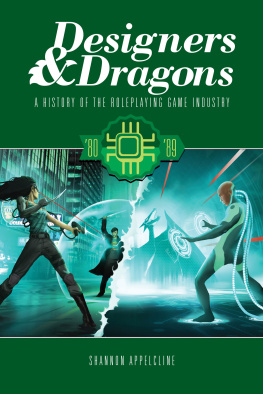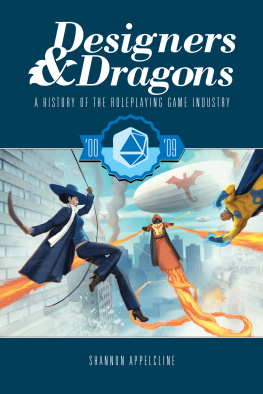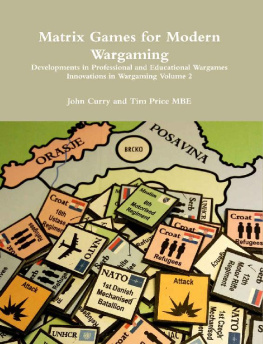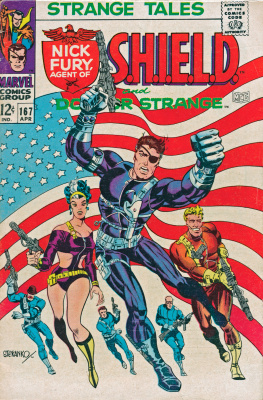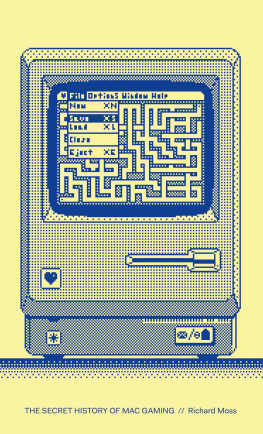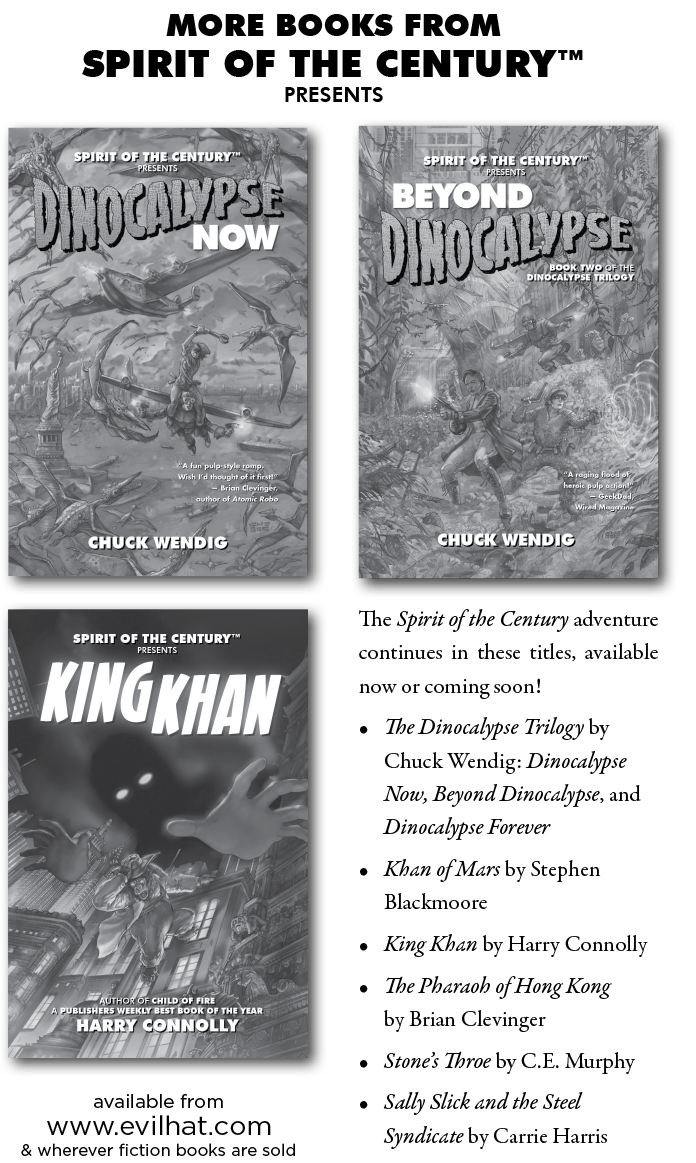Credits
Shannon Appelcline
Author and Researcher
John Adamus
Editor
Karen Twelves
Proofreader
Rita Tatum & Shannon Appelcline
Indexer
Fred Hicks and Adam Jury
Layout
Daniel Solis
Graphic Design
Andrew Bosley
Cover Art
Chris Hanrahan
Business Development
Carrie Harris
Marketing Manager
Sean Nittner
Project Manager
An Evil Hat Productions Publication
www.evilhat.com feedback@evilhat.com
@EvilHatOfficial on Twitter
facebook.com/EvilHatProductions
Designers and Dragons: The 70s
Copyright 2013 Shannon Appelcline
All rights reserved.
First published in 2013 by Evil Hat Productions, LLC.
10125 Colesville Rd #318, Silver Spring, MD 20901.
Evil Hat Productions and the Evil Hat and Fate logos are trademarks owned by Evil Hat Productions, LLC.
All rights reserved.
Softcover ISBN: 978-1-61317-075-5
Kindle ISBN: 978-1-61317-076-2
ePub ISBN: 978-1-61317-077-9
Printed in the USA.
All covers, ads, and other images from other publishers remain the property of their respective owners and are used here under fair use provisions for criticism, commentary, and scholarship.
No part of this publication may be reproduced, stored in a retrieval system, or transmitted in any form or by any means, electronic, mechanical, photocopying, recording, or otherwise, without the prior express permission of the publisher.
That said, if youre doing it for personal use, knock yourself out. Thats not only allowed, we encourage you to do it.
For those working at a copy shop and not at all sure if this means the person standing at your counter can make copies of this thing, they can.
This is express permission. Carry on.
The Magic of Beginnings
T he dawn of the gaming industry was magical, like the start of a new year or the birth of a baby. A bright and promising event was occurring as we watched, somewhat wide eyed with amazement and tickled by every new thing that occurred. It was like getting a new game thats so cool that we started to play before we even knew the rules.
I was in that zeitgeist up to my ears. I had just moved to California and my daughter had just been born. There I was, a young father in a new place seeking to establish myself. All options were open. Every act had long-term implications, none of which were known.
Incredibly, magic literally did help form Chaosium, which was like another child for me. I had not planned to start a company and help shape an industry. I designed my first game simply to fulfill a passion. My personal magic of the beginnings was a Tarot card reading that commanded me to start a company for an industry that did not yet exist. I dove into it; ignorant of what was needed, riding entirely on that passion. I published my game and went forth to sell it. Details of this courageous and nave act are contained in Shannons history of Chaosium, including wonderful facts about how our industry was formed.
Accurate facts and data fail to picture the excitement of the early days. At my first convention, sponsored by Avalon Hill, I discovered I was not alone in this passion. I was giddy from the discovery of other game companies. I knew AH would be there, and also TSR, and also Archive Miniatures, run by my friend Nevile Stocken who hauled in money literally hand over fist for his line of Star Wars figures. I was especially amused to find a company led by a guy named Bizarre and publishing a game by a guy named Symbolist (actually of course Bizar and Simbolist, being FGU with the monumental Chivalry & Sorcery released.) Scott Bizar met my wife and in an exuberant burst of gentlemanship asked, Do you have a sister? He would later become my brother-in-law.
Except for a one aloof company and one sinister figure, all was bright and warm friendship. I met more people than I can remember, including a pair of Englishmen who slept on my hotel floor and later founded the first English roleplaying company, Games Workshop. TSR stood aloof, but that was apparently a corporate stand because Tim Kask, publisher of The Dragon magazine, the Englishmen and I spent an extremely jolly afternoon sitting under an oak tree, laughing and coughing and swapping hopes and jokes and stories. Those friendships have lasted for years.
One figure stands a generation ahead of all of us, who are now the Grandfathers of the game industry. Lou Zocchi was there, as he has been at every significant game convention ever since. Lou has had some of his own games published, and is known for his world-famous dice. We all bought our dice from him, and for a while I thought that the polyhedral dice might go down in history being called Zocchis . But neither his games nor his dice are the reason hes the great-grandfather of gaming. Nor is it due to the fact he sold games out of his car for decades like an itinerant peddler with an endless pack of fun and frivolity. No, it is not because he has entertained us for 38 years with his musical saw, magic tricks and his dear companion Woody. Nor is it due to his virtuous dedication to rid our industry of the aforementioned sinister figure. It is because Lous heart has always been in the right place. He has been a model for us all with his generosity and willingness to share any and every bit of knowledge we needed to start this crazy business of ours. His benevolent attitude infected us all back then, to share whatever we needed to get into the business.
Other early conventions brought out the other luminaries of the gaming dawn. Rick Loomis was practically as established as Lou, but in the mail-order gaming before his first RPG, Tunnels and Trolls, by Ken St Andre. Frank Chadwick and Mark Miller almost shyly brought their first science fiction outer space game, Traveller . I particularly remember Pete Fenlon of I.C.E. who released his first RPG, Rolemaster , informing me proudly that it had a table for every possible combat interaction. Small claws against full plate, we got it.
Cool. Our new RPG doesnt have any tables, I shared. That of course was RuneQuest .
In those days everyone gave copies of their latest product to every other publisher. We were small enough to do that, and it was done with a generosity of spirit even if their game was over the top, without much promise of success.
Not everything was fun and perfect, of course. That villain mentioned above? That was Dave Casciano, who I saw at my first Origins convention sitting under a Nazi flag cleaning a firearm. I remember thinking, Whoa, what have I gotten into!? He used to advertise games and collect money, but never publish the product. He was ejected before the convention opened. He kept coming back though, the herpes of the gaming industry. Once again it was our hero, Lou Zocchi who got rid of him. He, and I too, were sued by the rotter, but Lou let no expense come between him and his crusade for virtue in gaming. He spent thousands of dollars to fly witnesses to testify at federal court until the judicial system accepted that Casciano was a pirate, thief and one bad apple among us. Thank you Lou.
After the headlong rush of the 70s, our industry changed. The first wave was nearly all designer-publishers like Chaosium. Afterward, we hired actual business people, like accountants and sales people; and formed a business association. Slowly, the emphasis changed from gaming to industry. Our initial small group of enthusiastic publishers grew.

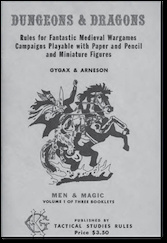

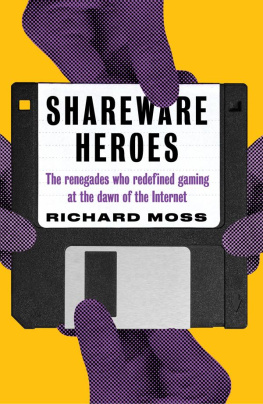
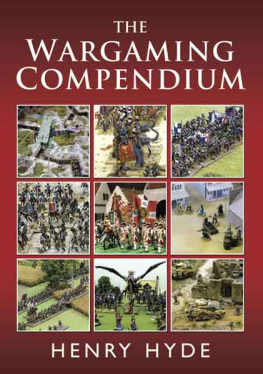
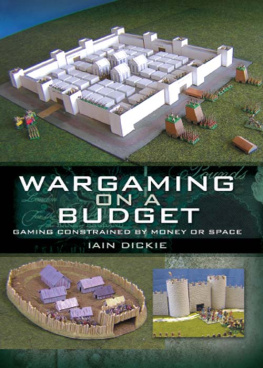
![Mark J. P. Wolf (editor) - Encyclopedia of Video Games: The Culture, Technology, and Art of Gaming [3 volumes]](/uploads/posts/book/279290/thumbs/mark-j-p-wolf-editor-encyclopedia-of-video.jpg)
